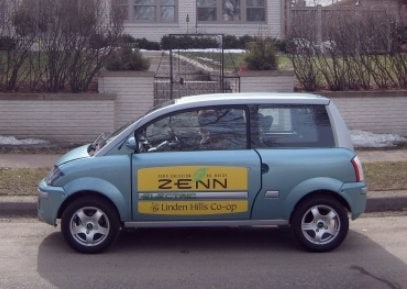

They haven’t actually made a car in some time, and now Zenn Motors (TSXV:ZNN) is severing its last tie to manufacturing.
The company today announced it will close its service operations and cease to provide parts and service support currently offered for ZENN LSVs, on June 30th.
ZENN Motors, which was founded in 2000, originally planned to build its own “Zero Emission No Noise” electric cars. The result of the Zenn car project was the NEV, or “Neighbourhood Electric Vehicle” which hit the markets in 2006. These vehicles were called LSV’s or “low-speed vehicles”, because their top speed was a mere 40 km/h.
The NEV, however, never went into mass production. In 2009, Zenn decided to shift directions, and to instead focus on building a highway capable electric drive system to market to major auto manufacturers. In April of 2007, Zenn invested 2.5 million for 3.8% of Texas-based battery maker EEStor, then increased that interest to 10.7% with another $5-million investment in mid-2009.
Today the electric drive system is Zenn’s focus, but its story has been fraught with controversy. Partner EEStor claims it has invented a created a storage unit for the automotive industry that has nearly three times the capacity of the next best technology, but the process of rolling out the technology has punctuated by doubt and delay, as critics cite a lack of transparency and supporters offer that the process must be so because of the sensitive nature of the intellectual property.
Regardless of how Zenn’s story turns out, evidence is mounting that mass production of the NEV would not have ended well.
Today, Coda Holdings, the Los Angeles-based parent of electric car maker CODA Automotive filed for bankruptcy protection after selling just 100 cars.
And Fisker, maker of the Fisker Karma plug-in sports car last month laid off three-quarters of its staff after sales of just 2000 cars.
The ascendance of Tesla Motors, however, has renewed interest in the space, especially after the company posted its first ever profitable quarter. CEO Elon Musk has had a tone that borders on defiance for several months.
“There have been many car start-ups over the past several decades, but profitability is what makes a company real,” he said recently. “Tesla is here to stay and keep fighting for the electric car revolution.”
Even with the charred landscape that is the electric car space, it isn’t just Tesla’s fight.
At the North American International Auto Show in January, General Motors President Mark Reuss offered his take after being queried about soft sales number for the Chevy Volt.
“The electric car is not dead,” he said. “Despite what you might hear, and despite what you might read about Americans not being ready for it, or about it being ‘under attack’ by local governments retracting incentives for it.”
Carlos Ghosn, global CEO of Nissan and Renault agrees with Reuss, but in an interview with the L.A. Times, he struck a more practical tone.
“The head winds are price and range anxiety…. What would really help is more charging infrastructure in urban areas,” he said. Ghosn said Nissan was looking to boost sales of its struggling Leaf by cutting its price.
So who killed Zenn’s NEV electric car? An under ripe market did, just in time for shareholders, who are seeing the company live to fight another day.
__________
Comment
Leave a Reply
You must be logged in to post a comment.





 Share
Share Tweet
Tweet Share
Share




Any body who really thought the ZENN car was anything more than a demonstration vehicle was naïve, I have held this stock since 2008, with full knowledge of this fact.. The strength of ZENN always was its exclusive distribution rights for EESTOR batteries, (now enhanced to 1005 of vehicles outside of military, and their 10% + position EESTOR which could soon be 41 %. The market potential for the technology is in in the $trillions. If EESTOR delivers, ZENN is a $500/share stock – at least. The development has been slower than I anticipated, but I am still confident.
My company is just a start up. Check out: https://www.indiegogo.com/projects/neighborhood-electric-vehicle/x/6322431
I worked at EEStor at the pilot plant. Everything was faked. I having gone crawling back to my old job. Stay away from the Weir family.
I think what helped Tesla is that it isn’t a NEV or LSV. It can go on highways. IMO, there isn’t much need for a NEV.
I like the teardrop design. It has a futuristic look to it.
Agreed. An electric car would need to be able to cruise at a minimum of 60 kph to be practical. If it could drive 60 kph then it could be used on city streets but banned from highways. Note: it would need to be able to cruise at 60 kph; not just have a top speed of 60 kph.